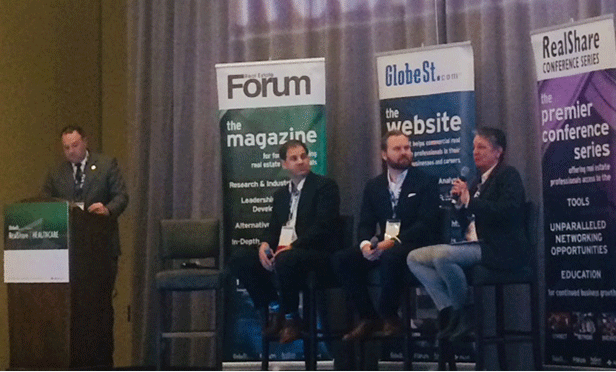 Technology panel at RealShare Healthcare
Technology panel at RealShare Healthcare
SCOTTSDALE, AZ—Innovation in healthcare technology has changed the rules of the game for hospitals and healthcare centers. It has and continues to do so. As in other industries, healthcare will be disrupted by advancements in technology like telemedicine and virtualized care programs, which are already rising in popularity with patients. But how will it impact brick-and-mortar space?
Panelists at the recent RealShare Healthcare conference here in Scottsdale, AZ, said that telemedicine will not replace the need for office visits. “I will not take away from the real estate,” panelists said.
What it will do, according to Justin Brasell, EVP of healthcare advisory services at Transwestern, is create efficiency. “We are missing a lot of people due to inefficiencies. We will continue to see more admissions and I think telehealth is also a differentiator.”
He pointed out that when you are a physician that offers telehealth, it is about hook/add for your patient to come back. “Telehealth will continue to drive occupancy and real estate but it will change what that real estate looks like. It is a great compliment to real estate and supercharge.”
Brasell is hyper focused on standardizing the physician clinic and piping in fiber for additional technology in the space. The future is “about standardization and flexibility within the new construction developments.”
Jake Dinner, SVP of development at PMB said that if you take a step back from the layout of the space, “the strategy behind the clinics really get into the data and determining the right size for the building, what are the service lines and when are they going to come available etc. so you can plan for future growth. We try to use data as much as possible. We work with clinical analysts to determine what needs to go into the building paired with telehealth.” He added that it is about being strategy based.
When asked about risk in telemedicine, Dinner doesn't see the risk in it and says health systems mitigate risk as much as they can. “The biggest thing with the evolution of telehealth will be education of the providers.”
The place healthcare technology will be most vulnerable, according to Dinner, will be the patient data for healthcare systems, which are 200 times more likely to get hacked than any other industry, Dinnen said. “There has been a huge influx in cyber protection and that impacts real estate because it significantly impacts their bottom line and they are looking to the real estate side to help with that.”
© 2025 ALM Global, LLC, All Rights Reserved. Request academic re-use from www.copyright.com. All other uses, submit a request to [email protected]. For more information visit Asset & Logo Licensing.








